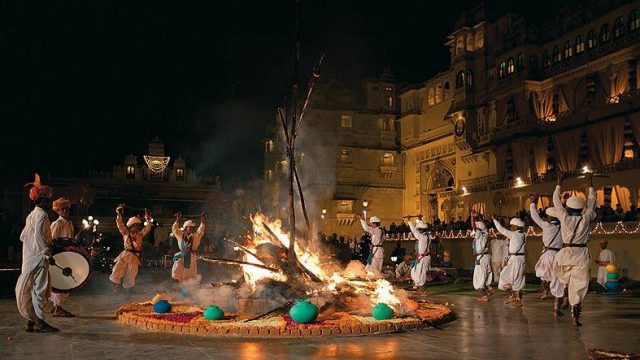Arriving a couple of days before Holi, I couldn’t quite tell if it was the thandai or the heat that lent Udaipur its languid grace…Rising from the centre of the lakes — unrippled, metallic blue in the hot afternoons — riding up the ramparts of the palaces and havelis, before plunging abruptly and spreading itself thin over the lanes of the old city. Peddlers of leather-bound journals and minakari trinkets, beggars and palace guards, all bore an air of casual indifference. Laughing and chattering, yet fidgety, like children waiting for the school bell to ring. No pushing, no jostling, no pleas in Pidgin English.
The only exceptions were the halwais, stirring milk in shallow kadhais and shaping giant disc-shaped shakkar paras, and women and children trading naked branches and kindling at busy intersections. Stripped of all green, and daubed at whim with red, the branches would feed the flames of Holika’s pyre the next day. Some might even blaze in the brightest, most magnificent bonfire in town — at Manek Chowk, the main square within the walls of the City Palace.
Tonight though, the maharana of Mewar and his family are entertaining private guests here. I walk past the lawns at sundown, even as the tables are laid and the lights hoisted on to the beautiful overhanging jharokhas. The mikes are tested, the tanpura tuned for a khayal recital by Ashwini Bhide from the Jaipur-Atrauli gharana. But for now, it’s the marching retinue of liveried men and their humdrum band that commands the attention of eager out-of-towners like me. They’re among the party that will set Holika ablaze tomorrow — leading the maharana’s procession or noubat ri avsari — at that hour when the aarti at the nearby Jagdish Temple ends with the jangling of bells. And the watery, full moon rises from its twilight slumber to turn the city, a spotless, sterling silver.
Yet for all the charms of such a vibrant build-up, Udaipur’s colours on Dhulendi or the main day of Holi are the brightest. What starts as a trickle turns into a deluge by midday, I’m told. Leaving a day too early to be drenched in the celebrations though, I court disappointment. Albeit momentarily. Till I find revelry 50km outside the city limits — to the northeast, past the battle-scarred Haldighati and the Eklingji temple — at Nathdwara.
A village-town as dusty as any other, it’s only around Holi that the dust settles on its sodden streets. Streets that get narrower and narrower before converging at the reigning deity Sreenathji’s temple. The temple where abir and gulal stain the marble steps a good month before Dhulendi and where scenes of the raas mimicking the exquisite Pichwais on the walls play out eight times a day in spring. No one returns untouched by orange, yellow, red and green. Not the local women in their pied leheriyas nor the Kathiawadis and (other) Gujaratis who come in droves for a darshan of this bejewelled incarnation of Krishna. Like muslin through a ring, I join the surge of devotees that makes its way down a taut corridor and into the viewing gallery, chanting loudly on cue. The chanting gets louder. The cadence of the dholak reaches a hypnotic crescendo. And the priest showers the press of bodies with a cloud of gulal — replacing, to my mind, the visions of regal splendour of Udaipur’s Holi entirely with its own exaggerated hues of faith and religion.
Outside, a young jeweller, unaware of my plans, warns me about joining the carousing that begins early next morning. He says, it’ll be — quite literally — a riot of colours. Showering each other with expletives more vivid than the deepest shade of red, Nathdwara’s gullies resound with sounds none too holy. No, it’s not as corporeal a performance as Barsana’s Lathmar Holi. Yet in many ways, it’s just as wounding and compelling.
Hours later, smeared and dusted with a little bit of Mewar, I come back blue to Delhi.




